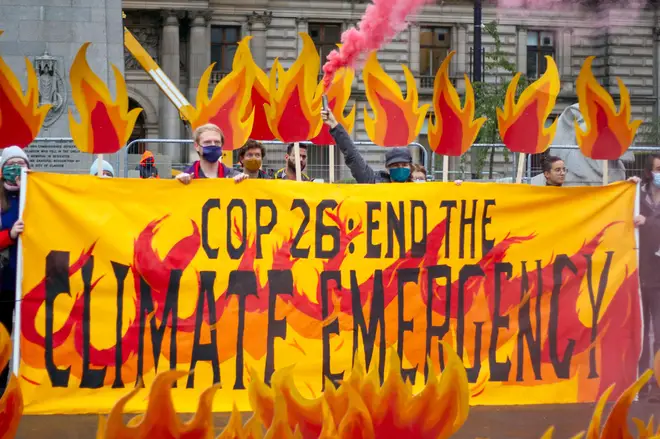
Rachel Johnson 7pm - 10pm
12 November 2021, 12:09 | Updated: 12 November 2021, 12:45

Draft plans to tackle climate change appear to have watered down targets to curb fossil fuels after COP26 negotiations.
Today leaders of COP26 have published a draft deal that could be agreed by world leaders after warnings that "time is running out".
The event has entered its official final day of talks, set to finish at 6pm today, but the new draft appears to have weakened its push to curb fossil fuels instead focusing on "rapidly scaling up clean power".
An earlier draft text called for nations "to accelerate the phase-out of coal and subsidies for fossil fuels".
The paragraph now focuses on "clean power generation" and reads: "(COP26) calls upon Parties to accelerate the development, deployment and dissemination of technologies and the adoption of policies for the transition towards low-emission energy systems, including by rapidly scaling up clean power generation and accelerating the phase-out of unabated coal power and of inefficient subsidies for fossil fuels."
Read more: 'Time is running out': Alok Sharma issues stark warning as COP26 end date looms
Read more: Climate activists 'disarm' luxury cars in Glasgow by deflating their tyres as COP26 nears its end
However, the latest draft also appears to ask countries to do more to limit global warming by "requesting" them to "strengthen" their national action plans by the end of 2022.
Under the 2015 Paris Agreement, nations agreed to hold global warming to well below 2C, and preferably limit it to 1.5C, compared to pre-industrial levels by 2030.
The draft COP26 proposal is now asking countries to “revisit and strengthen the 2030 targets" by the end of 2022 to ensure the global goal is reached.
There is also now a date - missing from the first draft - for when developed countries should double the provision of finance to help developing countries adapt to climate change - by 2025.
The deal must be agreed by all countries at the meeting before being approved and it is expected that talks will overrun from their agreed finish time.

Climate change protesters sceptical about #COP26
The inclusion of a reference to fossil fuels was a first for a UN decision document of this type and still may not survive to the final text as it is expected to get fierce pushback from some countries.
Shadow energy secretary Ed Miliband said he welcomes the draft text strengthening in some areas, but warned the 1.5C target is in "mortal peril".
Mr Miliband said, when it comes to halving global emissions this decade and limiting global warming to 1.5C, "the unfortunate reality is that we are miles off where we need to be".
Read more: Climate change: Why is 1.5C the magic number for controlling global warming?
Read more: What is COP26 and why does it matter? A complete guide to the key climate summit
He added when speaking to BBC Radio 4's Today programme: "The problem that remains for me in the text is there is ambiguity... the Paris goals were to keep global warming to well below 2C and make efforts to keep it to 1.5C, and there is ambiguity in the text about whether we are coming back for the former goal or the latter goal. So that needs strengthening if at all possible."
Scientists have warned that keeping temperature rises to 1.5C - beyond which the worst impacts of climate change will be felt - requires global emissions to be cut by 45 per cent by 2030, and to zero overall by mid-century.